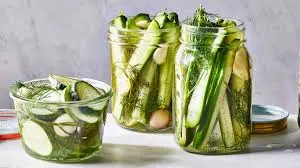Can a Dog Eat Pickles? Essential Insights
As a dog owner, One item that might catch your eye in the pantry is pickles. These crunchy, tangy snacks are a favorite for many people, but can a dog eat pickles? In this article, we’ll delve into the safety of pickles for dogs, explore potential health risks, and suggest healthier alternatives for your pet.

Understanding Pickles
Pickles are cucumbers that have been preserved in a brine solution made from vinegar, water, salt, and various seasonings. They are often enjoyed as snacks, sandwich toppings, or side dishes. While humans savor their bold flavor, it’s essential to consider whether pickles are safe for dogs.
Key Ingredients of Pickles
To evaluate the safety of pickles for dogs, let’s break down their main components:
- Cucumbers: Fresh cucumbers are safe and healthy for dogs. They are low in calories and high in water content, making them a refreshing snack.
- Vinegar: Vinegar is a common ingredient in pickles. While small amounts of vinegar are generally safe for dogs, excessive acidity can upset their stomachs.
- Salt: The salt content in pickles is usually high. Dogs can be sensitive to sodium, and too much salt can lead to health issues, including dehydration and salt poisoning.
- Spices and Flavorings: Many pickles include various spices, some of which can be harmful to dogs. Ingredients like garlic and onion are toxic and should be avoided.
Is It Safe for Dogs to Eat Pickles?
The answer to whether dogs can eat pickles is nuanced. While pickles are not toxic, several factors make them unsuitable for canine consumption. Here’s what to consider:
1. High Sodium Levels
Most pickles contain significant amounts of salt, which can be harmful to dogs. High sodium intake may lead to increased thirst, urination, and in severe cases, salt poisoning.
2. Gastrointestinal Distress
The acidic nature of pickles, coupled with their salt and spices, can cause gastrointestinal upset in dogs. Symptoms may include vomiting, diarrhea, and stomach discomfort. Dogs with sensitive stomachs are particularly at risk.
3. Toxic Ingredients
Pickles often contain harmful spices like garlic and onion, both of which can be dangerous for dogs. Even small quantities can result in severe health problems, including digestive issues and anemia.
4. Limited Nutritional Value
While cucumbers are nutritious, the pickling process often strips away many beneficial nutrients. Dogs need a balanced diet rich in vitamins and minerals, and pickles do not provide these essential nutrients.
What Should You Do If Your Dog Eats Pickles?
If your dog consumes a small piece of pickle, it’s generally not a cause for alarm. However, you should monitor them closely for any adverse reactions, such as:
- Vomiting
- Diarrhea
- Lethargy
- Decreased appetite
- Abdominal pain
If you notice any concerning symptoms or if your dog ingests a significant amount of pickles, it’s advisable to consult your veterinarian for guidance.
Healthier Alternatives to Pickles for Dogs
If you’re looking for safe and nutritious treats for your dog, consider these alternatives:
1. Fresh Cucumbers
Sliced or diced fresh cucumbers make a perfect crunchy snack for dogs. They are low in calories and hydrating, making them a refreshing option.
2. Carrots
Carrots are an excellent source of vitamins and minerals. They are low in calories and help promote dental health, making them a great snack for dogs.
3. Green Beans
Fresh or steamed green beans can be a nutritious addition to your dog’s diet. They are low in calories and high in fiber, promoting digestive health.
4. Sweet Potatoes
Cooked and mashed sweet potatoes are not only tasty but also packed with nutrients. They are a good source of fiber and vitamins, supporting your dog’s overall health.
5. Pumpkin Puree
Plain canned pumpkin (not the spiced pie filling) is an excellent source of fiber and can aid in digestion. Most dogs find it delicious and beneficial.
Conclusion: Can a Dog Eat Pickles?
In conclusion, while pickles are not toxic to dogs, they are not recommended due to their high salt content, potential for gastrointestinal upset, and harmful ingredients. Instead of offering pickles as a snack, consider healthier alternatives that provide essential nutrients without the associated risks.
If you’re unsure about what foods are safe for your dog, consulting your veterinarian is always a good idea. They can provide personalized advice based on your dog’s dietary needs and health conditions. By prioritizing your dog’s health and well-being, you can ensure they live a happy and healthy life, free from the potential dangers of foods like pickles.
